Lesson 55 Not a gold mine 新概念英语二册超详教案讲义笔记
文档属性
| 名称 | Lesson 55 Not a gold mine 新概念英语二册超详教案讲义笔记 | 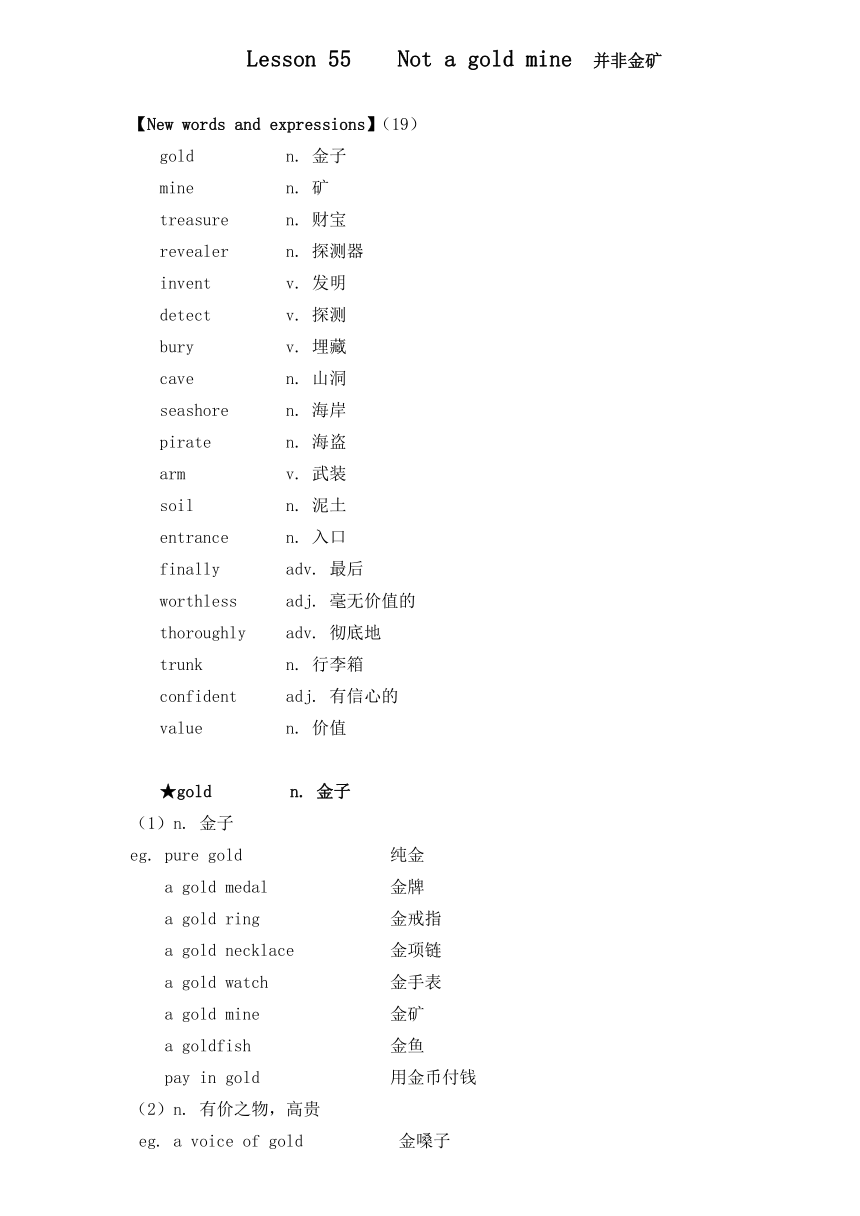 | |
| 格式 | docx | ||
| 文件大小 | 45.5KB | ||
| 资源类型 | 教案 | ||
| 版本资源 | 新概念英语 | ||
| 科目 | 英语 | ||
| 更新时间 | 2023-09-26 08:11:20 | ||
图片预览

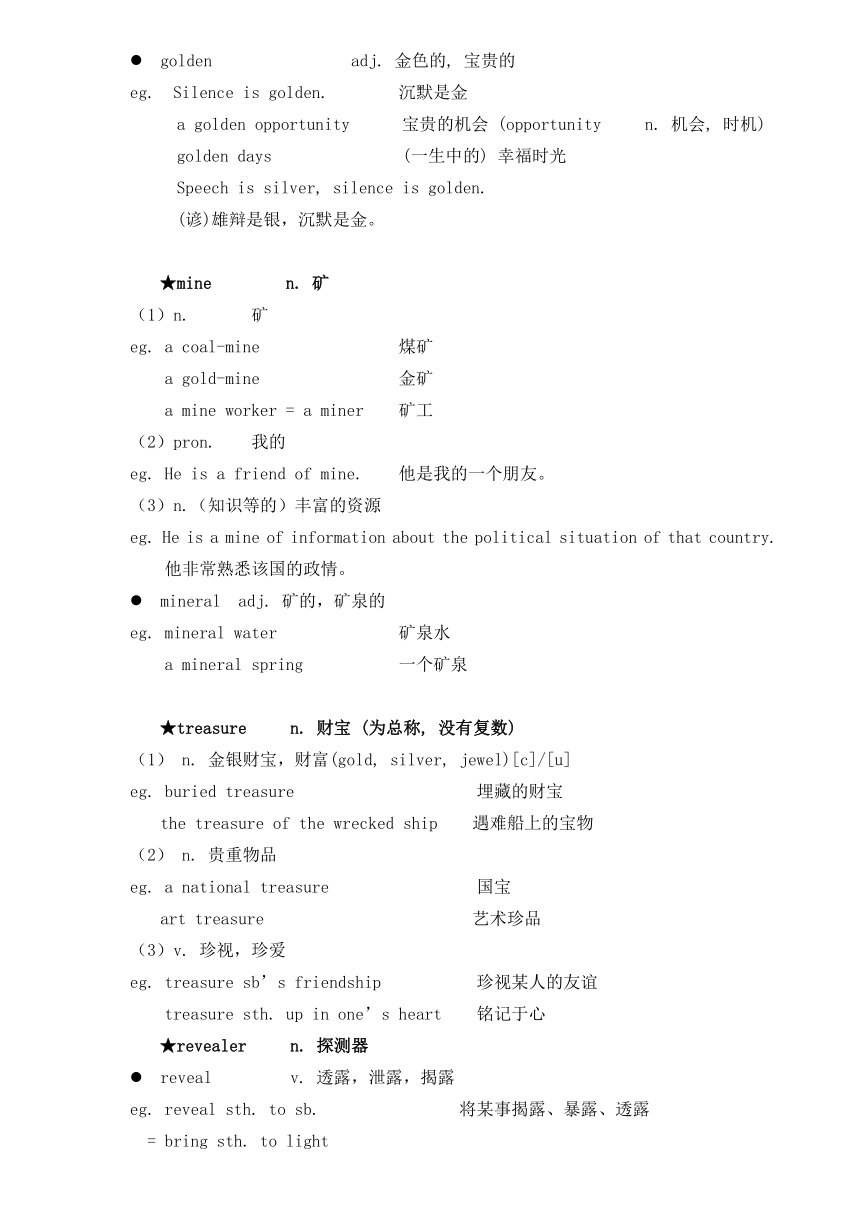
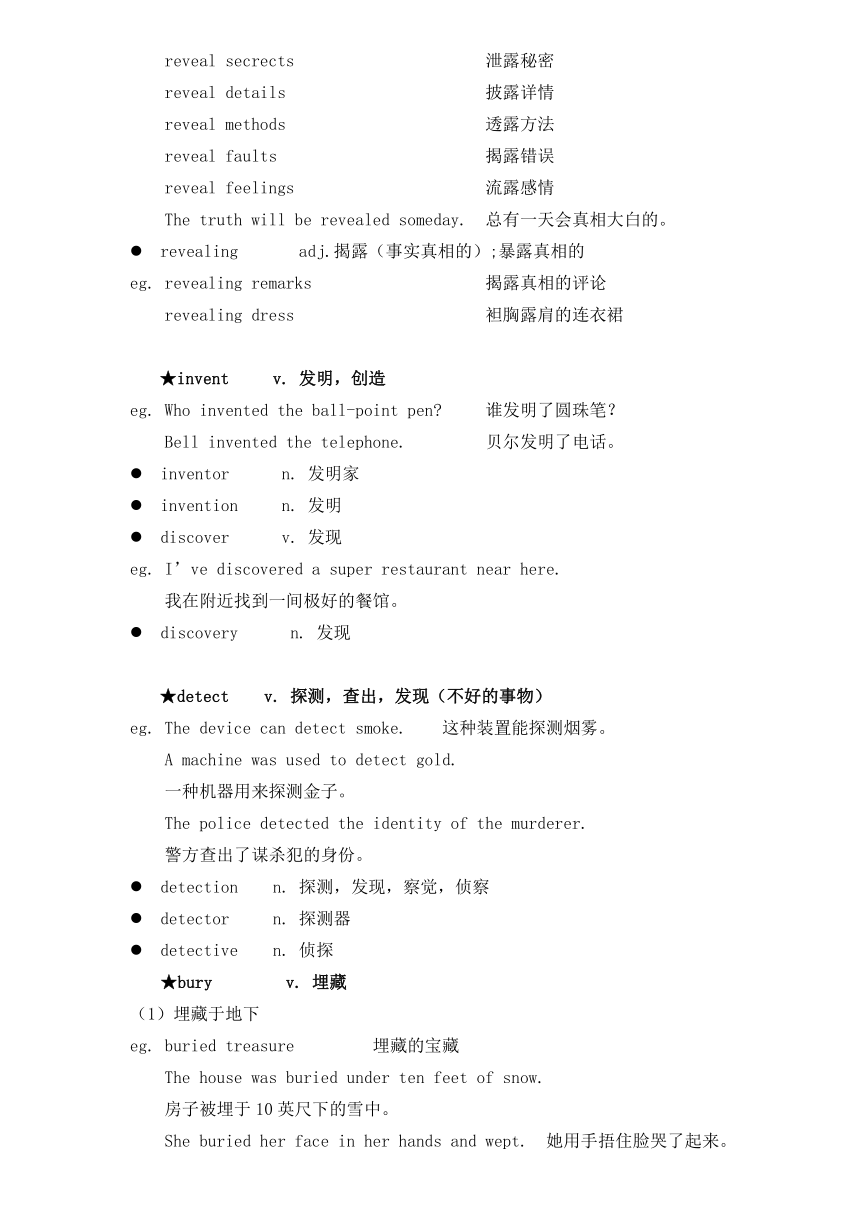
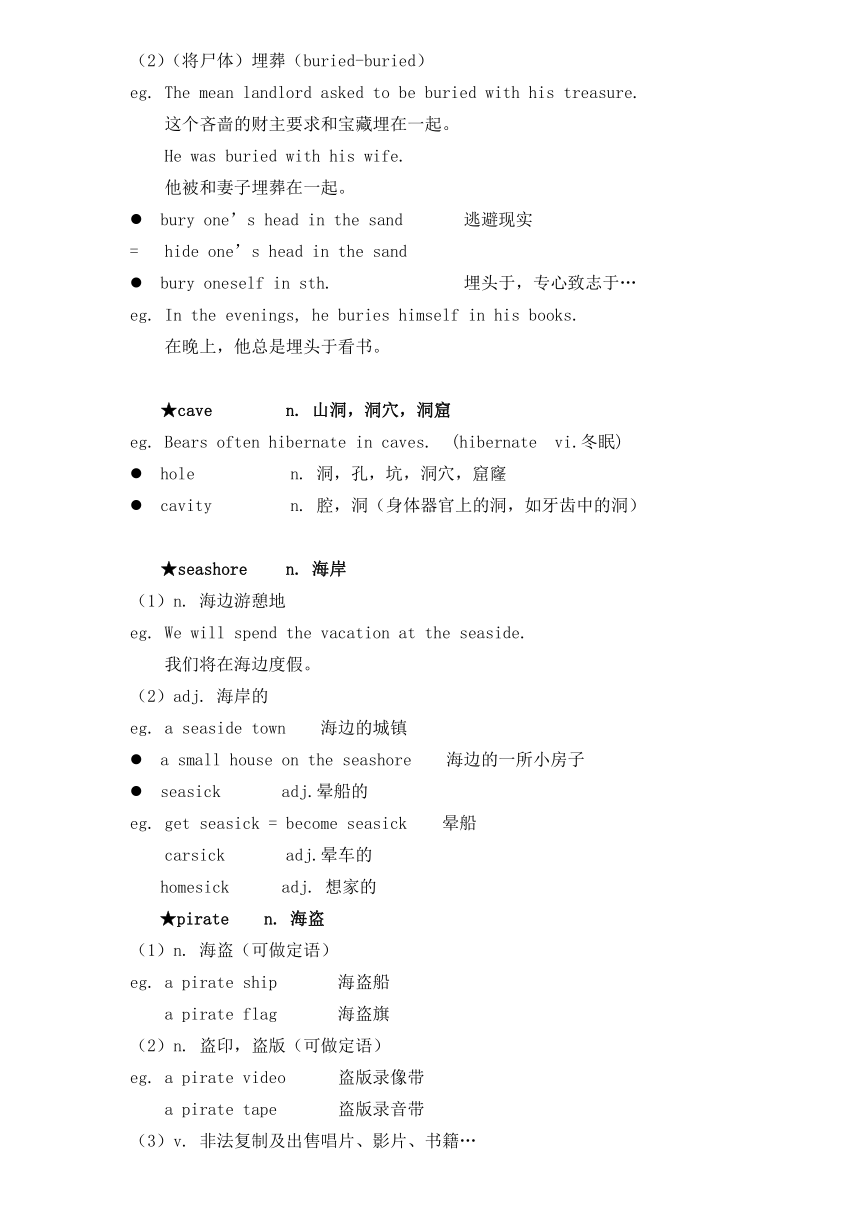
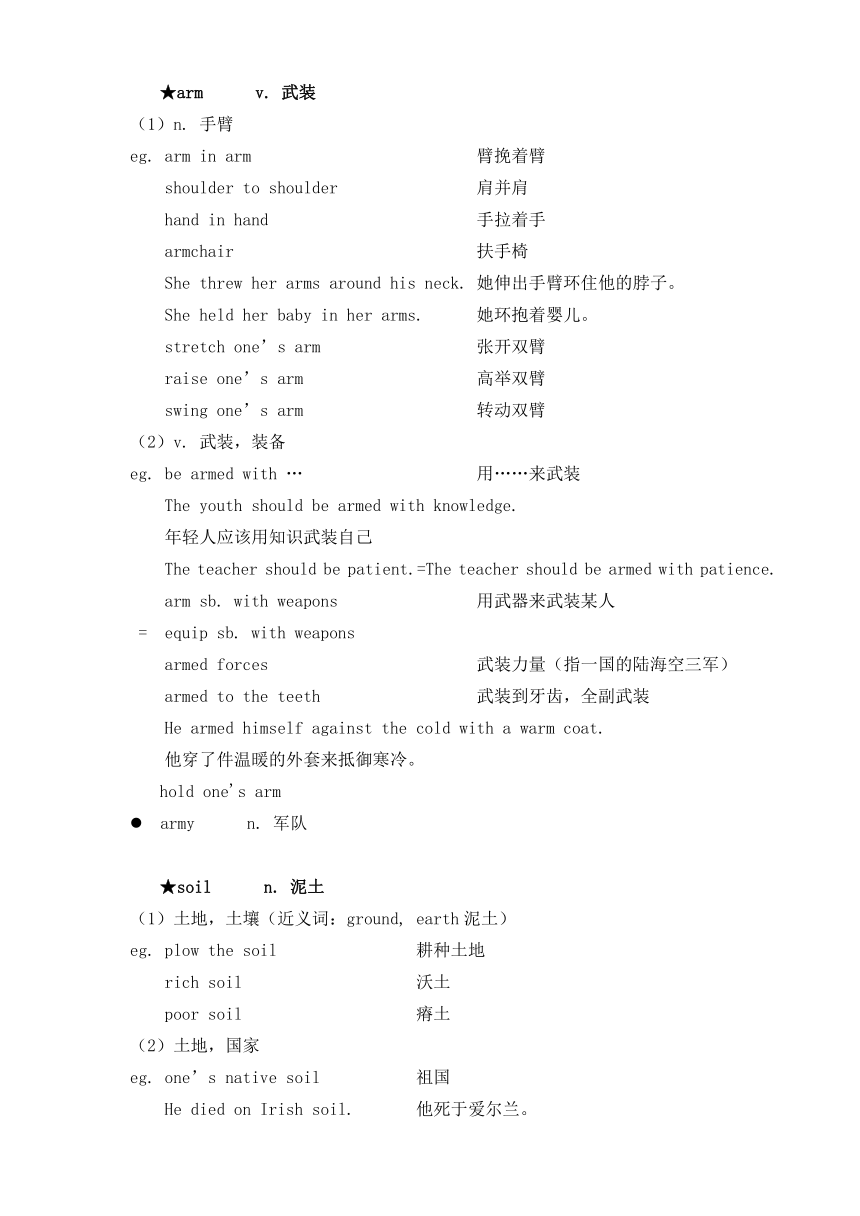
文档简介
Lesson 55 Not a gold mine 并非金矿
【New words and expressions】(19)
gold n. 金子
mine n. 矿
treasure n. 财宝
revealer n. 探测器
invent v. 发明
detect v. 探测
bury v. 埋藏
cave n. 山洞
seashore n. 海岸
pirate n. 海盗
arm v. 武装
soil n. 泥土
entrance n. 入口
finally adv. 最后
worthless adj. 毫无价值的
thoroughly adv. 彻底地
trunk n. 行李箱
confident adj. 有信心的
value n. 价值
★gold n. 金子
(1)n. 金子
eg. pure gold 纯金
a gold medal 金牌
a gold ring 金戒指
a gold necklace 金项链
a gold watch 金手表
a gold mine 金矿
a goldfish 金鱼
pay in gold 用金币付钱
(2)n. 有价之物,高贵
eg. a voice of gold 金嗓子
golden adj. 金色的, 宝贵的
eg. Silence is golden. 沉默是金
a golden opportunity 宝贵的机会 (opportunity n. 机会, 时机)
golden days (一生中的) 幸福时光
Speech is silver, silence is golden.
(谚)雄辩是银,沉默是金。
★mine n. 矿
(1)n. 矿
eg. a coal-mine 煤矿
a gold-mine 金矿
a mine worker = a miner 矿工
(2)pron. 我的
eg. He is a friend of mine. 他是我的一个朋友。
(3)n.(知识等的)丰富的资源
eg. He is a mine of information about the political situation of that country.
他非常熟悉该国的政情。
mineral adj. 矿的,矿泉的
eg. mineral water 矿泉水
a mineral spring 一个矿泉
★treasure n. 财宝 (为总称, 没有复数)
n. 金银财宝,财富(gold, silver, jewel)[c]/[u]
eg. buried treasure 埋藏的财宝
the treasure of the wrecked ship 遇难船上的宝物
n. 贵重物品
eg. a national treasure 国宝
art treasure 艺术珍品
(3)v. 珍视,珍爱
eg. treasure sb’s friendship 珍视某人的友谊
treasure sth. up in one’s heart 铭记于心
★revealer n. 探测器
reveal v. 透露,泄露,揭露
eg. reveal sth. to sb. 将某事揭露、暴露、透露
= bring sth. to light
reveal secrects 泄露秘密
reveal details 披露详情
reveal methods 透露方法
reveal faults 揭露错误
reveal feelings 流露感情
The truth will be revealed someday. 总有一天会真相大白的。
revealing adj.揭露(事实真相的);暴露真相的
eg. revealing remarks 揭露真相的评论
revealing dress 袒胸露肩的连衣裙
★invent v. 发明,创造
eg. Who invented the ball-point pen 谁发明了圆珠笔?
Bell invented the telephone. 贝尔发明了电话。
inventor n. 发明家
invention n. 发明
discover v. 发现
eg. I’ve discovered a super restaurant near here.
我在附近找到一间极好的餐馆。
discovery n. 发现
★detect v. 探测,查出,发现(不好的事物)
eg. The device can detect smoke. 这种装置能探测烟雾。
A machine was used to detect gold.
一种机器用来探测金子。
The police detected the identity of the murderer.
警方查出了谋杀犯的身份。
detection n. 探测,发现,察觉,侦察
detector n. 探测器
detective n. 侦探
★bury v. 埋藏
(1)埋藏于地下
eg. buried treasure 埋藏的宝藏
The house was buried under ten feet of snow.
房子被埋于10英尺下的雪中。
She buried her face in her hands and wept. 她用手捂住脸哭了起来。
(2)(将尸体)埋葬(buried-buried)
eg. The mean landlord asked to be buried with his treasure.
这个吝啬的财主要求和宝藏埋在一起。
He was buried with his wife.
他被和妻子埋葬在一起。
bury one’s head in the sand 逃避现实
= hide one’s head in the sand
bury oneself in sth. 埋头于,专心致志于…
eg. In the evenings, he buries himself in his books.
在晚上,他总是埋头于看书。
★cave n. 山洞,洞穴,洞窟
eg. Bears often hibernate in caves. (hibernate vi.冬眠)
hole n. 洞,孔,坑,洞穴,窟窿
cavity n. 腔,洞(身体器官上的洞,如牙齿中的洞)
★seashore n. 海岸
(1)n. 海边游憩地
eg. We will spend the vacation at the seaside.
我们将在海边度假。
(2)adj. 海岸的
eg. a seaside town 海边的城镇
a small house on the seashore 海边的一所小房子
seasick adj.晕船的
eg. get seasick = become seasick 晕船
carsick adj.晕车的
homesick adj. 想家的
★pirate n. 海盗
(1)n. 海盗(可做定语)
eg. a pirate ship 海盗船
a pirate flag 海盗旗
(2)n. 盗印,盗版(可做定语)
eg. a pirate video 盗版录像带
a pirate tape 盗版录音带
(3)v. 非法复制及出售唱片、影片、书籍…
★arm v. 武装
(1)n. 手臂
eg. arm in arm 臂挽着臂
shoulder to shoulder 肩并肩
hand in hand 手拉着手
armchair 扶手椅
She threw her arms around his neck. 她伸出手臂环住他的脖子。
She held her baby in her arms. 她环抱着婴儿。
stretch one’s arm 张开双臂
raise one’s arm 高举双臂
swing one’s arm 转动双臂
(2)v. 武装,装备
eg. be armed with … 用……来武装
The youth should be armed with knowledge.
年轻人应该用知识武装自己
The teacher should be patient.=The teacher should be armed with patience.
arm sb. with weapons 用武器来武装某人
= equip sb. with weapons
armed forces 武装力量(指一国的陆海空三军)
armed to the teeth 武装到牙齿,全副武装
He armed himself against the cold with a warm coat.
他穿了件温暖的外套来抵御寒冷。
hold one's arm
army n. 军队
★soil n. 泥土
(1)土地,土壤(近义词:ground, earth泥土)
eg. plow the soil 耕种土地
rich soil 沃土
poor soil 瘠土
(2)土地,国家
eg. one’s native soil 祖国
He died on Irish soil. 他死于爱尔兰。
★entrance n. 入口
(1)入口(反义词:exit)
entrance of/to… ……的入口
eg. entrance of the park 公园的入口
= entrance to the park
(2)入学
entrance into college 进入大学
= entrance to college
entrance examination 入学考试
★finally adv. 最后地,终于
final adj. 最后的
(last仅表示顺序的最后,final表示一连串事情的终了。)
eg. final preparations before leaving 出发前的最后准备
What’s the final word of this dictionary
这本词典最后一个字是什么?
final decision 最后决定
final goal 最终目标
finals n. 期末考试
take the finals 参加期末考试
final n. 决赛
the World Cup Final 世界杯决赛
★worthless adj. 毫无价值的
= valueless
-less表反义的后缀:
brainless 愚笨的
meaningless 无意义的
homeless 无家可归的
harmless 无害处的
helpless 无助的
hopeless 没有希望的
endless 没有尽头的
useless 毫无用处的
priceless 无价的,珍贵的
worth adj. 有价值的,值得的
be worth doing 值得做某事
eg. The film is worth seeing again. 这部电影值得再看一次。
★thoroughly adv. 彻底地
= completely = every inch
eg. He is a thoroughly nice person. 他是个彻底的大好人。
They searched the cave thoroughly. 他们彻底地搜查了山洞。
thorough adj. 彻底的,完全的
eg. give the room a thorough cleaning 给房间来次彻底的打扫
completely/thoroughly/totally
through prep. 穿过
eg. go through the tunnel 穿过隧道
★trunk n. 行李箱
(1)n. 大衣箱,大旅行箱
briefcase 公文包
handbag 手提包
suitcase 手提箱
shoulder bag 有肩带的女用手提包
knap sack 背包,登山袋
backpack 背包
(2)n. 树干,躯干
trunk 树干
leaf 树叶
twig 嫩枝
bough 大树枝
branch 树枝
root 树根
象鼻子
(美)(轿车车尾的)行李箱 / (英:boot)
★confident adj. 有信心的
be confident of doing sth. 做某事有信心
be confident of sth. 对某事有信心
be confident that + 从句 对…有信心
eg. He is confident of success. 他对成功充满信心。
She is confident that she will win the race.
她有信心会赢得比赛。
a confident candidate 有信心的候选人
in a confident manner 用自信的方式
a confident smile 自信的微笑
a confident speech 有信心的讲话
a confident look 自信的表情
confidence n. 信心
confidential adj.
机密的
eg. confidential papers 机密文件
极信任的,可以依赖的
eg. confidential secretary 机要秘书
★ value n. 价值
(1)价值,效用
eg. We must realize the value of humor. 我们必须意识到幽默的价值。
(2)价格,价钱
eg. market value 市场价格
the value of land 土地的价格
valuable adj.有价值的
eg. something is valuable 某事物是有价值的 (主系表结构)
= something is of value
valueless adj.无价值的,无效果的
= worthless
invaluable 极有价值的
priceless 极其贵重的
numberless 无数的
innumerable 多得数不清的,极多的
numerous 很多的
【Text】
Dreams of finding lost treasure almost came true recently. A new machine called 'The Revealer' has been invented and it has been used to detect gold which has been buried in the ground. The machine was used in a cave near the seashore where -- it is said -- pirates used to hide gold. The pirates would often bury gold in the cave and then fail to collect it. Armed with the new machine, a search party went into the cave hoping to find buried treasure. The leader of the party was examining the soil near the entrance to the cave when the machine showed that there was gold under the ground. Very excited, the party dug a hole two feel deep. They finally found a small gold coin which was almost worthless. The party then searched the whole cave thoroughly but did not find anything except an empty tin trunk. In spite of this, many people are confident that 'The Revealer' may reveal something of value fairly soon.
参考译文
最近, 找到失踪宝藏的梦想差一点儿变成现实. 一种叫 “探宝器” 的新机器已经发明出来, 并被人们用来探测地下埋藏的金子. 在靠近海边的一个据说过去海盗常在里面藏金子的岩洞里, 这种机器被派上了用场. 海盗们过去常把金子埋藏在那个洞里, 可后来却没能取走. 一支用这种新机器装备起来的探宝队进入了这个岩洞, 希望找到埋藏着的金子. 当这个队的队长正在检查洞口附近的土壤时, 那台机器显示出它的下面埋有金子. 队员们异常激动, 就地挖了一个两英尺深的坑, 但最后找到的是一枚几乎一钱不值的小金币. 队员们接着又把整个洞彻底搜寻了一遍, 但除了一只空铁皮箱外什么也没找到. 尽管如此, 很多人仍然相信 “探宝器” 很快就会探出值钱的东西来.
【课文讲解】
1、Dreams of finding lost treasure almost came true recently.
dream n. 梦;v. 做梦
of + v.ing 介词短语作后置定语
eg. a girl of seventeen 一个17岁的女孩
a coat of bright color 颜色鲜艳的外套
a vase of great value 一个很值钱的花瓶
a distance of 18 miles 18英里的路程
come true (愿望等)实现
(不用被动形式)
eg. His dream came true. 他的梦想实现了。
= He realized his dream.
= His dream was realized.
2、A new machine called 'The Revealer' has been invented and it has been used to detect gold which has been buried in the ground.
called the ‘the Revealer’是过去分词短语作定语修饰machine
which has been buried in the ground 作定语从句修饰gold
(1)be used to do 被用来做
= be used for doing
eg. This tool is used for cutting. 这个工具是被用来砍东西的。
This bottle is used to hold the medicine. 这个瓶子是被用来装药的。
(2)used to do 过去常常做某事
eg. We used to live in the city. 我们过去住在这个城市
(3)be used to + n./pron./doing 习惯于做某事
= become used to = get used to
eg. He is used to this kind of job. 他习惯于这种工作了。
You’ll soon get used to our way of living.
你很快会习惯我们的生活方式的。
I’m used to looking after myself. 我习惯于照顾我自己了。
(4)be used up 用完,耗尽
eg. The soldiers were used up after the long battle.
长时间的战斗之后,战士们筋疲力尽。
3、The machine was used in a cave near the seashore where -- it is said -- pirates used to hide gold.
was used in 被使用
near the seashore 是个介词短语作定语修饰cave
where it is said – pirates used to hide gold 作定语从句修饰cave
where = in which翻译时译为 “在那儿”
it is said是插入语,当“据说”讲,不影响句子成分。
4、The pirates would often bury gold in the cave and then fail to collect it.
would often do 表示过去某段时间内经常性动作
fail to do sth. 未能、不能、忘记做某事项
(fail后面接动词不定式表示否定)
eg. If you receive a request like this, you can’t fail to obey it.
假如你收到这样一个请求,你是不会不去做的。
collect的含义之一为“(去)取,接”
5、Armed with the new machine, a search party went into the cave hoping to find buried treasure.
armed with… 过去分词短语作状语,表示伴随状态。
eg. The professor came out of the classroom, followed by his students.
教授走出教室,后面跟着学生。 (followed过去分词表达被动含义)
hoping to find 现在分词短语作状语,表示伴随状态。
eg. The manager approached us smiling. 经理笑着向我们走来。
Some people left the hall still weeping. 一些人哭着离开大厅。
如果几个句子的主语是同一事物, 则可以把几个句子合并为一个句子。保留一个句子做主句, 其他的变成非谓语动词。非谓语动词采用何种形式, 则根据其与主语的关系, 如果是主动关系, 用-ing, 被动关系, 则用动词的-ed形式。
主句与其他句子的位置安排要保持句子的平衡, 还要注意动作的连贯
The boy went home. The boy was crying. The boy was beaten.
= Beaten by sb, the boy went home, crying.
6、The leader of the party was examining the soil near the entrance to the cave when the machine showed that there was gold under the ground.
was examining 过去进行时,描述故事发生当时的背景
that there was gold under the ground是showed的宾语从句
entrance to …的入口
7、Very excited, the party dug a hole two feet deep.
Very excited
(分词短语位于句首时,多用来说明原因或说明动作发生时主语所处的状态。)
eg. Tired of sleeping on the floor, he decided to buy a real bed.
two feet deep是后置定语修饰hole
dig v. 挖掘,挖凿(dug dug)
eg. dig a tunnel through the mountain 通过山挖个隧道
8、They finally found a small gold coin which was almost worthless. The party then searched the whole cave thoroughly but did not find anything except an empty tin trunk.
which was almost worthless作定语从句修饰coin
except 除了(减法)
besides 除了(加法)
9、In spite of this, many people are confident that 'The Revealer' may reveal something of value fairly soon.
in spite of + n./pron./doing 尽管
be confident that… 对…充满信心
something of value 有价值的东西
(of value作后置定语,修饰something)
of表示其所修饰的名词具有某种性质、状况,of加名词往往让人联想这名词对应的形容词
something of value = something valuable 有价值的
something of small value 价值很小(= almost worthless)
形容词要放在不定代词的后边
something important = something of importance
someone patient = someone of patience
fairly soon 相当快
fairly adv. 适当,相当地(语气最轻的一个“还算,勉强”)
eg. The work is fairly hard. 这份工作还算难。
quite adv. 相当地(比fairly稍强,相当于very)
eg. It is quite hot. 今天非常热。
rather adv. 相当,颇
(最强,表示超出平常或所需要的,一般暗示令人不喜欢的事。)
eg. It’s rather hot today. I can hardly bear it.
今天相当热,我都受不了了。
I’ve eaten rather so much. 我都吃了这么多了。
【Key structures】
表示过去习惯性动作
used to 与would
used to 和 would 都可用来描述在过去某段时间内的习惯动作,或经常干的事,一般来说,我们用used to 来开始一段故事;used to可用来表示现在与过去的对比,而would 不能。
used to 可用来表示过去的状态和情况;would只表示过去重复的动作,不能表示状态和情况。
would可用于表示过去很不规则的习惯,所以常和often, always, frequently, sometimes 等时间频度副词连用;在非正式文体中used to 也可以这样用。
分词用法:
(现在分词doing/过去分词 v.+ed)
分词性质:
具有形容词或者副词性质,可以在句中担任表语、定语、宾补或状语。其中,现在分词表示主动的含义,或动作正在进行;过去分词表示被动含义,或动作已完成。
2.分词的用法:
作表语、定语、宾补或状语。
作定语:单个分词做定语,放在所修饰的名词之前。分词短语做定语,放在所修饰的名词之后。分词做定语的句子都能改写为定语从句。区别现在分词做定语和动名词做定语,现在分词做定语,表示动作正在进行;动名词做定语,表示某种功能。
eg. a sleeping baby = a baby who is sleeping
a running dog = a dog which is running
a broken glass = a glass which is broken
a beaten team = a team which is beaten
eg. a sleeping car动名词做定语; a sleeping baby 现在分词做定语
a reading room a reading girl
a swimming pool a swimming player
作表语:do+ing 令人… ;do+ed 感到…
eg. The news sounds exciting. 这个消息听起来令人振奋。
They got very excited. 他们感到非常兴奋。
His father seems pleased with his score.
他的父亲看起来对他的成绩很满意。
My watch is gone. 我的表不见了。
作宾补:后接宾语再接分词做宾补的常用动词。
感观动词:hear, see, notice, watch, feel,find…
使役性动词:make, let , have, get…
eg. When I woke up, I found my mother sitting beside me.
当我醒来的时候,我发现我妈妈正坐在我旁边。
I’d like to have this package weighed.
我想这个包裹称一下。
I hear a bell ringing somewhere.
我听到铃在某个地方响起。
I had a tooth pulled off. 我牙被拔了。
I found the snake eating the eggs. 我发现蛇正在吃鸡蛋。
I found the eggs eaten by the snake. 我发现鸡蛋被蛇吃了。
作状语(现在分词表主动,进行;过去分词表被动,完成)
短语:
发展中国家 developing countries
发达国家 developed countries
(地上的)落叶 fallen leaves
(正在飘落的)落叶 falling leaves
(正在沸腾的)开水 boiling water
(开过的)水 boiled water
落水者 a drowning person
溺水者 a drowned person
【Special difficulties】
use, be used to, used to
use vt. 用,使用,运用,应用
May I use your dictionary/car
I don’t know how to use the word.
be used to 习惯于(后面跟名词或动名词,be也可用get等代替)
I soon got used to getting up early when I started working as a baker.
I’m used to shopping alone.
used to 过去习惯……(表示过去有而现在通常已不存在的习惯,只用于一般过去时,后面只能跟动词不定式)
I used to get up early when I worked as a baker, but I don’t have to get up early now.
You didn’t use to smoke.
Gold and Golden
glod
① n. 金,黄金,金币,金块
He loves gold more than anything else.
② adj. 金的
When Frank retired, they gave him a gold watch.
All that glitters is not gold. (all…is not… 不是所有的,部分否定 not all)
golden adj. 金色的,(机会等)非常好的,兴盛的
As the sun set, the sky became golden.
As he grew older, he always thought about the golden days of his life.
You’ve missed a golden chance to make a lot of money.
【New words and expressions】(19)
gold n. 金子
mine n. 矿
treasure n. 财宝
revealer n. 探测器
invent v. 发明
detect v. 探测
bury v. 埋藏
cave n. 山洞
seashore n. 海岸
pirate n. 海盗
arm v. 武装
soil n. 泥土
entrance n. 入口
finally adv. 最后
worthless adj. 毫无价值的
thoroughly adv. 彻底地
trunk n. 行李箱
confident adj. 有信心的
value n. 价值
★gold n. 金子
(1)n. 金子
eg. pure gold 纯金
a gold medal 金牌
a gold ring 金戒指
a gold necklace 金项链
a gold watch 金手表
a gold mine 金矿
a goldfish 金鱼
pay in gold 用金币付钱
(2)n. 有价之物,高贵
eg. a voice of gold 金嗓子
golden adj. 金色的, 宝贵的
eg. Silence is golden. 沉默是金
a golden opportunity 宝贵的机会 (opportunity n. 机会, 时机)
golden days (一生中的) 幸福时光
Speech is silver, silence is golden.
(谚)雄辩是银,沉默是金。
★mine n. 矿
(1)n. 矿
eg. a coal-mine 煤矿
a gold-mine 金矿
a mine worker = a miner 矿工
(2)pron. 我的
eg. He is a friend of mine. 他是我的一个朋友。
(3)n.(知识等的)丰富的资源
eg. He is a mine of information about the political situation of that country.
他非常熟悉该国的政情。
mineral adj. 矿的,矿泉的
eg. mineral water 矿泉水
a mineral spring 一个矿泉
★treasure n. 财宝 (为总称, 没有复数)
n. 金银财宝,财富(gold, silver, jewel)[c]/[u]
eg. buried treasure 埋藏的财宝
the treasure of the wrecked ship 遇难船上的宝物
n. 贵重物品
eg. a national treasure 国宝
art treasure 艺术珍品
(3)v. 珍视,珍爱
eg. treasure sb’s friendship 珍视某人的友谊
treasure sth. up in one’s heart 铭记于心
★revealer n. 探测器
reveal v. 透露,泄露,揭露
eg. reveal sth. to sb. 将某事揭露、暴露、透露
= bring sth. to light
reveal secrects 泄露秘密
reveal details 披露详情
reveal methods 透露方法
reveal faults 揭露错误
reveal feelings 流露感情
The truth will be revealed someday. 总有一天会真相大白的。
revealing adj.揭露(事实真相的);暴露真相的
eg. revealing remarks 揭露真相的评论
revealing dress 袒胸露肩的连衣裙
★invent v. 发明,创造
eg. Who invented the ball-point pen 谁发明了圆珠笔?
Bell invented the telephone. 贝尔发明了电话。
inventor n. 发明家
invention n. 发明
discover v. 发现
eg. I’ve discovered a super restaurant near here.
我在附近找到一间极好的餐馆。
discovery n. 发现
★detect v. 探测,查出,发现(不好的事物)
eg. The device can detect smoke. 这种装置能探测烟雾。
A machine was used to detect gold.
一种机器用来探测金子。
The police detected the identity of the murderer.
警方查出了谋杀犯的身份。
detection n. 探测,发现,察觉,侦察
detector n. 探测器
detective n. 侦探
★bury v. 埋藏
(1)埋藏于地下
eg. buried treasure 埋藏的宝藏
The house was buried under ten feet of snow.
房子被埋于10英尺下的雪中。
She buried her face in her hands and wept. 她用手捂住脸哭了起来。
(2)(将尸体)埋葬(buried-buried)
eg. The mean landlord asked to be buried with his treasure.
这个吝啬的财主要求和宝藏埋在一起。
He was buried with his wife.
他被和妻子埋葬在一起。
bury one’s head in the sand 逃避现实
= hide one’s head in the sand
bury oneself in sth. 埋头于,专心致志于…
eg. In the evenings, he buries himself in his books.
在晚上,他总是埋头于看书。
★cave n. 山洞,洞穴,洞窟
eg. Bears often hibernate in caves. (hibernate vi.冬眠)
hole n. 洞,孔,坑,洞穴,窟窿
cavity n. 腔,洞(身体器官上的洞,如牙齿中的洞)
★seashore n. 海岸
(1)n. 海边游憩地
eg. We will spend the vacation at the seaside.
我们将在海边度假。
(2)adj. 海岸的
eg. a seaside town 海边的城镇
a small house on the seashore 海边的一所小房子
seasick adj.晕船的
eg. get seasick = become seasick 晕船
carsick adj.晕车的
homesick adj. 想家的
★pirate n. 海盗
(1)n. 海盗(可做定语)
eg. a pirate ship 海盗船
a pirate flag 海盗旗
(2)n. 盗印,盗版(可做定语)
eg. a pirate video 盗版录像带
a pirate tape 盗版录音带
(3)v. 非法复制及出售唱片、影片、书籍…
★arm v. 武装
(1)n. 手臂
eg. arm in arm 臂挽着臂
shoulder to shoulder 肩并肩
hand in hand 手拉着手
armchair 扶手椅
She threw her arms around his neck. 她伸出手臂环住他的脖子。
She held her baby in her arms. 她环抱着婴儿。
stretch one’s arm 张开双臂
raise one’s arm 高举双臂
swing one’s arm 转动双臂
(2)v. 武装,装备
eg. be armed with … 用……来武装
The youth should be armed with knowledge.
年轻人应该用知识武装自己
The teacher should be patient.=The teacher should be armed with patience.
arm sb. with weapons 用武器来武装某人
= equip sb. with weapons
armed forces 武装力量(指一国的陆海空三军)
armed to the teeth 武装到牙齿,全副武装
He armed himself against the cold with a warm coat.
他穿了件温暖的外套来抵御寒冷。
hold one's arm
army n. 军队
★soil n. 泥土
(1)土地,土壤(近义词:ground, earth泥土)
eg. plow the soil 耕种土地
rich soil 沃土
poor soil 瘠土
(2)土地,国家
eg. one’s native soil 祖国
He died on Irish soil. 他死于爱尔兰。
★entrance n. 入口
(1)入口(反义词:exit)
entrance of/to… ……的入口
eg. entrance of the park 公园的入口
= entrance to the park
(2)入学
entrance into college 进入大学
= entrance to college
entrance examination 入学考试
★finally adv. 最后地,终于
final adj. 最后的
(last仅表示顺序的最后,final表示一连串事情的终了。)
eg. final preparations before leaving 出发前的最后准备
What’s the final word of this dictionary
这本词典最后一个字是什么?
final decision 最后决定
final goal 最终目标
finals n. 期末考试
take the finals 参加期末考试
final n. 决赛
the World Cup Final 世界杯决赛
★worthless adj. 毫无价值的
= valueless
-less表反义的后缀:
brainless 愚笨的
meaningless 无意义的
homeless 无家可归的
harmless 无害处的
helpless 无助的
hopeless 没有希望的
endless 没有尽头的
useless 毫无用处的
priceless 无价的,珍贵的
worth adj. 有价值的,值得的
be worth doing 值得做某事
eg. The film is worth seeing again. 这部电影值得再看一次。
★thoroughly adv. 彻底地
= completely = every inch
eg. He is a thoroughly nice person. 他是个彻底的大好人。
They searched the cave thoroughly. 他们彻底地搜查了山洞。
thorough adj. 彻底的,完全的
eg. give the room a thorough cleaning 给房间来次彻底的打扫
completely/thoroughly/totally
through prep. 穿过
eg. go through the tunnel 穿过隧道
★trunk n. 行李箱
(1)n. 大衣箱,大旅行箱
briefcase 公文包
handbag 手提包
suitcase 手提箱
shoulder bag 有肩带的女用手提包
knap sack 背包,登山袋
backpack 背包
(2)n. 树干,躯干
trunk 树干
leaf 树叶
twig 嫩枝
bough 大树枝
branch 树枝
root 树根
象鼻子
(美)(轿车车尾的)行李箱 / (英:boot)
★confident adj. 有信心的
be confident of doing sth. 做某事有信心
be confident of sth. 对某事有信心
be confident that + 从句 对…有信心
eg. He is confident of success. 他对成功充满信心。
She is confident that she will win the race.
她有信心会赢得比赛。
a confident candidate 有信心的候选人
in a confident manner 用自信的方式
a confident smile 自信的微笑
a confident speech 有信心的讲话
a confident look 自信的表情
confidence n. 信心
confidential adj.
机密的
eg. confidential papers 机密文件
极信任的,可以依赖的
eg. confidential secretary 机要秘书
★ value n. 价值
(1)价值,效用
eg. We must realize the value of humor. 我们必须意识到幽默的价值。
(2)价格,价钱
eg. market value 市场价格
the value of land 土地的价格
valuable adj.有价值的
eg. something is valuable 某事物是有价值的 (主系表结构)
= something is of value
valueless adj.无价值的,无效果的
= worthless
invaluable 极有价值的
priceless 极其贵重的
numberless 无数的
innumerable 多得数不清的,极多的
numerous 很多的
【Text】
Dreams of finding lost treasure almost came true recently. A new machine called 'The Revealer' has been invented and it has been used to detect gold which has been buried in the ground. The machine was used in a cave near the seashore where -- it is said -- pirates used to hide gold. The pirates would often bury gold in the cave and then fail to collect it. Armed with the new machine, a search party went into the cave hoping to find buried treasure. The leader of the party was examining the soil near the entrance to the cave when the machine showed that there was gold under the ground. Very excited, the party dug a hole two feel deep. They finally found a small gold coin which was almost worthless. The party then searched the whole cave thoroughly but did not find anything except an empty tin trunk. In spite of this, many people are confident that 'The Revealer' may reveal something of value fairly soon.
参考译文
最近, 找到失踪宝藏的梦想差一点儿变成现实. 一种叫 “探宝器” 的新机器已经发明出来, 并被人们用来探测地下埋藏的金子. 在靠近海边的一个据说过去海盗常在里面藏金子的岩洞里, 这种机器被派上了用场. 海盗们过去常把金子埋藏在那个洞里, 可后来却没能取走. 一支用这种新机器装备起来的探宝队进入了这个岩洞, 希望找到埋藏着的金子. 当这个队的队长正在检查洞口附近的土壤时, 那台机器显示出它的下面埋有金子. 队员们异常激动, 就地挖了一个两英尺深的坑, 但最后找到的是一枚几乎一钱不值的小金币. 队员们接着又把整个洞彻底搜寻了一遍, 但除了一只空铁皮箱外什么也没找到. 尽管如此, 很多人仍然相信 “探宝器” 很快就会探出值钱的东西来.
【课文讲解】
1、Dreams of finding lost treasure almost came true recently.
dream n. 梦;v. 做梦
of + v.ing 介词短语作后置定语
eg. a girl of seventeen 一个17岁的女孩
a coat of bright color 颜色鲜艳的外套
a vase of great value 一个很值钱的花瓶
a distance of 18 miles 18英里的路程
come true (愿望等)实现
(不用被动形式)
eg. His dream came true. 他的梦想实现了。
= He realized his dream.
= His dream was realized.
2、A new machine called 'The Revealer' has been invented and it has been used to detect gold which has been buried in the ground.
called the ‘the Revealer’是过去分词短语作定语修饰machine
which has been buried in the ground 作定语从句修饰gold
(1)be used to do 被用来做
= be used for doing
eg. This tool is used for cutting. 这个工具是被用来砍东西的。
This bottle is used to hold the medicine. 这个瓶子是被用来装药的。
(2)used to do 过去常常做某事
eg. We used to live in the city. 我们过去住在这个城市
(3)be used to + n./pron./doing 习惯于做某事
= become used to = get used to
eg. He is used to this kind of job. 他习惯于这种工作了。
You’ll soon get used to our way of living.
你很快会习惯我们的生活方式的。
I’m used to looking after myself. 我习惯于照顾我自己了。
(4)be used up 用完,耗尽
eg. The soldiers were used up after the long battle.
长时间的战斗之后,战士们筋疲力尽。
3、The machine was used in a cave near the seashore where -- it is said -- pirates used to hide gold.
was used in 被使用
near the seashore 是个介词短语作定语修饰cave
where it is said – pirates used to hide gold 作定语从句修饰cave
where = in which翻译时译为 “在那儿”
it is said是插入语,当“据说”讲,不影响句子成分。
4、The pirates would often bury gold in the cave and then fail to collect it.
would often do 表示过去某段时间内经常性动作
fail to do sth. 未能、不能、忘记做某事项
(fail后面接动词不定式表示否定)
eg. If you receive a request like this, you can’t fail to obey it.
假如你收到这样一个请求,你是不会不去做的。
collect的含义之一为“(去)取,接”
5、Armed with the new machine, a search party went into the cave hoping to find buried treasure.
armed with… 过去分词短语作状语,表示伴随状态。
eg. The professor came out of the classroom, followed by his students.
教授走出教室,后面跟着学生。 (followed过去分词表达被动含义)
hoping to find 现在分词短语作状语,表示伴随状态。
eg. The manager approached us smiling. 经理笑着向我们走来。
Some people left the hall still weeping. 一些人哭着离开大厅。
如果几个句子的主语是同一事物, 则可以把几个句子合并为一个句子。保留一个句子做主句, 其他的变成非谓语动词。非谓语动词采用何种形式, 则根据其与主语的关系, 如果是主动关系, 用-ing, 被动关系, 则用动词的-ed形式。
主句与其他句子的位置安排要保持句子的平衡, 还要注意动作的连贯
The boy went home. The boy was crying. The boy was beaten.
= Beaten by sb, the boy went home, crying.
6、The leader of the party was examining the soil near the entrance to the cave when the machine showed that there was gold under the ground.
was examining 过去进行时,描述故事发生当时的背景
that there was gold under the ground是showed的宾语从句
entrance to …的入口
7、Very excited, the party dug a hole two feet deep.
Very excited
(分词短语位于句首时,多用来说明原因或说明动作发生时主语所处的状态。)
eg. Tired of sleeping on the floor, he decided to buy a real bed.
two feet deep是后置定语修饰hole
dig v. 挖掘,挖凿(dug dug)
eg. dig a tunnel through the mountain 通过山挖个隧道
8、They finally found a small gold coin which was almost worthless. The party then searched the whole cave thoroughly but did not find anything except an empty tin trunk.
which was almost worthless作定语从句修饰coin
except 除了(减法)
besides 除了(加法)
9、In spite of this, many people are confident that 'The Revealer' may reveal something of value fairly soon.
in spite of + n./pron./doing 尽管
be confident that… 对…充满信心
something of value 有价值的东西
(of value作后置定语,修饰something)
of表示其所修饰的名词具有某种性质、状况,of加名词往往让人联想这名词对应的形容词
something of value = something valuable 有价值的
something of small value 价值很小(= almost worthless)
形容词要放在不定代词的后边
something important = something of importance
someone patient = someone of patience
fairly soon 相当快
fairly adv. 适当,相当地(语气最轻的一个“还算,勉强”)
eg. The work is fairly hard. 这份工作还算难。
quite adv. 相当地(比fairly稍强,相当于very)
eg. It is quite hot. 今天非常热。
rather adv. 相当,颇
(最强,表示超出平常或所需要的,一般暗示令人不喜欢的事。)
eg. It’s rather hot today. I can hardly bear it.
今天相当热,我都受不了了。
I’ve eaten rather so much. 我都吃了这么多了。
【Key structures】
表示过去习惯性动作
used to 与would
used to 和 would 都可用来描述在过去某段时间内的习惯动作,或经常干的事,一般来说,我们用used to 来开始一段故事;used to可用来表示现在与过去的对比,而would 不能。
used to 可用来表示过去的状态和情况;would只表示过去重复的动作,不能表示状态和情况。
would可用于表示过去很不规则的习惯,所以常和often, always, frequently, sometimes 等时间频度副词连用;在非正式文体中used to 也可以这样用。
分词用法:
(现在分词doing/过去分词 v.+ed)
分词性质:
具有形容词或者副词性质,可以在句中担任表语、定语、宾补或状语。其中,现在分词表示主动的含义,或动作正在进行;过去分词表示被动含义,或动作已完成。
2.分词的用法:
作表语、定语、宾补或状语。
作定语:单个分词做定语,放在所修饰的名词之前。分词短语做定语,放在所修饰的名词之后。分词做定语的句子都能改写为定语从句。区别现在分词做定语和动名词做定语,现在分词做定语,表示动作正在进行;动名词做定语,表示某种功能。
eg. a sleeping baby = a baby who is sleeping
a running dog = a dog which is running
a broken glass = a glass which is broken
a beaten team = a team which is beaten
eg. a sleeping car动名词做定语; a sleeping baby 现在分词做定语
a reading room a reading girl
a swimming pool a swimming player
作表语:do+ing 令人… ;do+ed 感到…
eg. The news sounds exciting. 这个消息听起来令人振奋。
They got very excited. 他们感到非常兴奋。
His father seems pleased with his score.
他的父亲看起来对他的成绩很满意。
My watch is gone. 我的表不见了。
作宾补:后接宾语再接分词做宾补的常用动词。
感观动词:hear, see, notice, watch, feel,find…
使役性动词:make, let , have, get…
eg. When I woke up, I found my mother sitting beside me.
当我醒来的时候,我发现我妈妈正坐在我旁边。
I’d like to have this package weighed.
我想这个包裹称一下。
I hear a bell ringing somewhere.
我听到铃在某个地方响起。
I had a tooth pulled off. 我牙被拔了。
I found the snake eating the eggs. 我发现蛇正在吃鸡蛋。
I found the eggs eaten by the snake. 我发现鸡蛋被蛇吃了。
作状语(现在分词表主动,进行;过去分词表被动,完成)
短语:
发展中国家 developing countries
发达国家 developed countries
(地上的)落叶 fallen leaves
(正在飘落的)落叶 falling leaves
(正在沸腾的)开水 boiling water
(开过的)水 boiled water
落水者 a drowning person
溺水者 a drowned person
【Special difficulties】
use, be used to, used to
use vt. 用,使用,运用,应用
May I use your dictionary/car
I don’t know how to use the word.
be used to 习惯于(后面跟名词或动名词,be也可用get等代替)
I soon got used to getting up early when I started working as a baker.
I’m used to shopping alone.
used to 过去习惯……(表示过去有而现在通常已不存在的习惯,只用于一般过去时,后面只能跟动词不定式)
I used to get up early when I worked as a baker, but I don’t have to get up early now.
You didn’t use to smoke.
Gold and Golden
glod
① n. 金,黄金,金币,金块
He loves gold more than anything else.
② adj. 金的
When Frank retired, they gave him a gold watch.
All that glitters is not gold. (all…is not… 不是所有的,部分否定 not all)
golden adj. 金色的,(机会等)非常好的,兴盛的
As the sun set, the sky became golden.
As he grew older, he always thought about the golden days of his life.
You’ve missed a golden chance to make a lot of money.
同课章节目录
